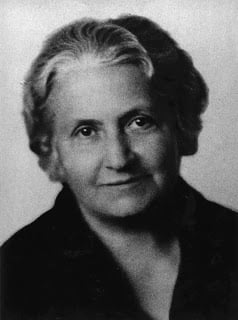Maria Montessori was a strong advocate that children learn through play and the learning environment is a hugely important aspect of education.
She believed that by giving children physical objects they can manipulate to solve problems, they gain a deeper understanding of subjects, as their hands become the brains tools (Montessori, 1967).

Maria Montessori
In 2022, the Montessori Method is still widely used and taught throughout Ireland and worldwide.
As methods such as play therapy, child psychology and special needs education are evolving in the early education space, what is the value of learning the Montessori method?
Amy Burns is a Montessori tutor at Portobello Institute, she shares her insights into why the Montessori method is still so valuable.
What is the Montessori pedagogy?
Through extensive research carried out on young children, some with additional needs, Italian educator and doctor, Maria Montessori developed a method of education whereby children learn in a natural environment, through exploration and at their own individual pace.
She observed that by showing respect to each individual child by allowing freedom of choice, movement and speech in a specially prepared environment, children are motivated and eager to work uninterrupted.
Between the ages of birth and six years, children have what Montessori named the absorbent mind, an effortless ability to learn through their senses.
Why is it used so widely today?
Montessori education is recognised the world over particularly as a method of education for preschool children.
All the latest research recognises that young children learn best by doing and Montessori schools are filled with specially designed materials developed to meet the child’s individual, developmental needs.
Montessori schools across Ireland meet all the standards of Siolta, the National Quality Framework for Early Childhood Education and through the vast array of curricular materials it also links with Aistear, the Early Childhood Curriculum Framework.
How is Montessori different from other teaching methods?
Montessori education focuses on the child’s individual development. It recognises that all children should learn at their own pace and that we as educators should guide and direct the children but ultimately, they learn independently through repetitive, hands-on learning with specially designed materials.
The prepared environment is a home from home, safe classroom which gives way to exploration, discovery and freedom.
Children develop independence and respect whilst building confidence enabling also social and emotional development. Montessori education is child-centred and promotes inclusion.
How does Montessori compare with Play Therapy?
Montessori pedagogy and Play therapy actually complement each other, they share many characteristics.
The language differs in that Montessorians tend to refer to the child’s “work” whereas during play therapy the adult is observing the child “play”.
However, aside from the language, the ultimate goal remains the same – the child is exploring, repeating and processing the experiences around him.
The role of the adult is also similar in relation to preparing the materials and the environment to ensure the child has the best learning experience based on his individual needs.
Both methods are mostly child-directed.
What is the value of having a Montessori qualification?
Montessori education is a wonderful pedagogy to understand and implement in any preschool setting.
Today early years settings follow the themes of Aistear and children are introduced to many subjects, materials and toys.
Early years practitioners are now being recognised as professional educators implementing a very significant curriculum into preschool classrooms across the country.
Having a Montessori qualification gives the educator a wider knowledge and understanding of the history of early years education and pedagogy developed by a lady who was certainly way ahead of her time!
Having such a qualification will also give the opportunity of setting up a Montessori school or simply becoming a Montessori educator in a school.
The knowledge gained by having a Montessori qualification will also very much complement a play therapy qualification (as discussed above), ECCE or Early Childhood Studies.
What sets a Montessori and ECCE qualification apart from an ECCE qualification alone?
Having a Montessori and ECCE qualification combined gives a much wider knowledge and in-depth understanding of an early years setting.
Even if the learner does not necessarily plan on teaching in a Montessori school, understanding the importance of a prepared environment, observation, direct and indirect aims of various materials to name only some key factors can only enhance ones teaching skills and ability.
Montessori pedagogy will also very much stand to anyone who wishes to work with children who have additional needs given the wonderful nature of the Montessori ethos and philosophy.
How to gain a Montessori qualification?
Portobello Institute is renowned for its early childhood studies and Montessori training.
Trends show that early years professionals with level 7, level 8 or higher degrees are coming back to add Montessori Teaching to their skill set.
If you are interested in gaining a recognised Montessori qualification, check out our courses.



.png?width=1200&name=EY%20Blog%20Feature%20Images%20(3).png)
.png?width=352&name=Michelles%20Blog%20Feature%20Images%20(33).png)
-3.png?width=352&name=Untitled%20design%20(2)-3.png)